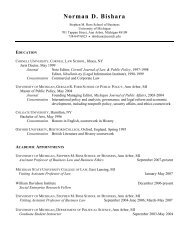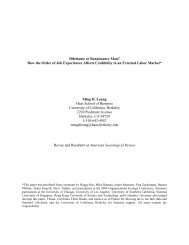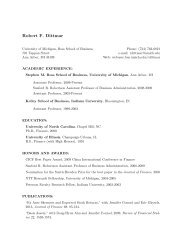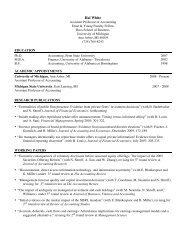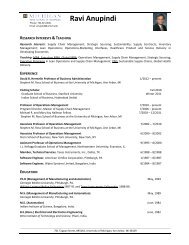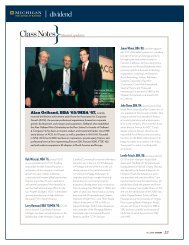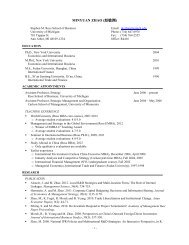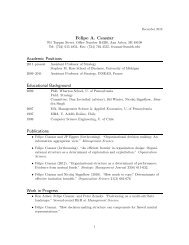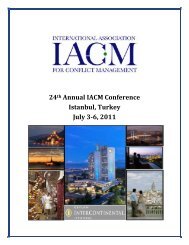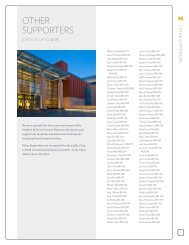DIvIDEnD - Stephen M. Ross School of Business - University of ...
DIvIDEnD - Stephen M. Ross School of Business - University of ...
DIvIDEnD - Stephen M. Ross School of Business - University of ...
You also want an ePaper? Increase the reach of your titles
YUMPU automatically turns print PDFs into web optimized ePapers that Google loves.
FirstPerson<br />
like many people worldwide, i watched the<br />
coverage <strong>of</strong> January’s earthquake in haiti<br />
from the safety <strong>of</strong> my living room. i felt a<br />
heartbreaking million miles away from the country<br />
i left just three years earlier to pursue my mBa at<br />
<strong>Ross</strong>. Day after day, cnn delivered vivid images<br />
<strong>of</strong> Anderson Cooper and Sanjay Gupta, BS ’90/<br />
MD ’93, against a backdrop <strong>of</strong> makeshift tents and<br />
rubble. i connected with their obvious frustration<br />
that assistance and supplies were slow to arrive,<br />
causing “senseless and preventable” suffering.<br />
i knew all too well from my time in haiti that the<br />
dilemma <strong>of</strong> not having what you need — when you<br />
need it — is nothing new for this island nation.<br />
Prior to <strong>Ross</strong>, i worked with Partners<br />
in health in Boston and in rural haiti, a<br />
bumpy two-hour drive north <strong>of</strong> Port-au-<br />
Prince on largely unpaved roads. my role<br />
was to help manage maternal and child<br />
healthcare programs across a network<br />
<strong>of</strong> nine full-service, chiefly haitianrun<br />
hospitals delivering free care to<br />
a poverty-stricken population. in my<br />
everyday work — be it devising a grant’s<br />
implementation plan, establishing a new<br />
protocol to collect data, or producing a<br />
quarterly financial report — i quickly<br />
learned that my managerial success was<br />
rooted in my ability to engage, listen<br />
to, and support the expert vision <strong>of</strong> the<br />
haitian staff — community health<br />
workers and doctors alike.<br />
watching the earthquake coverage,<br />
i was reminded <strong>of</strong> a day trip in 2006. i<br />
accompanied a team <strong>of</strong> haitian medical<br />
staff on one <strong>of</strong> the multiple mobile clinics<br />
held each week for remote mountaintop<br />
communities surrounding the main<br />
hospitals. truck, then foot, then donkeys<br />
took us to meet the patients who had<br />
been waiting since sunrise. one elderly<br />
peasant farmer mumbled between gaps<br />
where teeth used to be, his hands shaking<br />
64 <strong>DIvIDEnD</strong> spring 2010<br />
Lighting the<br />
Way in Haiti<br />
Dara Moses, MBA ’09, Partners in Health (2004-07)<br />
as he explained to the haitian nurse,<br />
“M gen yon dlo si k’ap lave mwen.” (the<br />
sour water washes over me.) later i<br />
learned that, like so many others we saw<br />
that day, he complained <strong>of</strong> heartburn —<br />
not from indigestion but from an empty<br />
stomach. we had climbed this mountain<br />
to provide healthcare, only to come face<br />
to face with endemic hunger. armed only<br />
with drugs, the nurse had no choice but<br />
to medicate his hunger with antacids<br />
and vitamins.<br />
far more people than expected arrived<br />
at the clinic, and the nurse insisted we<br />
stay until everyone was seen. already<br />
dusk, we packed the remaining supplies<br />
onto the donkeys and descended<br />
the increasingly dark footpath. without<br />
an electric grid or a full moon, the countryside<br />
soon became so dark that even<br />
the donkeys had trouble maintaining<br />
their footing. the nurse started calling<br />
out for help. within moments, a local<br />
woman shouted back to us that she had a<br />
flashlight, but no batteries. a man’s voice<br />
then emerged from a different direction,<br />
<strong>of</strong>fering us the batteries straight out <strong>of</strong><br />
his handheld radio. out <strong>of</strong> the darkness,<br />
local residents pieced together a working<br />
Dara Moses, MBA ’09,<br />
with colleagues from the<br />
partners in Health pharmacy<br />
team in Haiti, 2006.<br />
flashlight that led us the rest <strong>of</strong> the way.<br />
the global outpouring <strong>of</strong> support for<br />
haiti has been incredible. the <strong>Ross</strong> community<br />
has mobilized to take the best<br />
possible action in this terrible situation,<br />
raising money to support Partners in<br />
health and other locally embedded organizations<br />
working to “build back better.”<br />
i know firsthand how frustrating it<br />
can be to address one issue in haiti, only<br />
to discover another — be it a chronic<br />
lack <strong>of</strong> food or the crippling logistical<br />
difficulties <strong>of</strong> distributing supplies to the<br />
people who need it most. as i think back<br />
on those peasant farmers who helped a<br />
trained medical team procure a critical<br />
flashlight, i am reminded <strong>of</strong> the valuable<br />
human resources that exist on the<br />
ground in haiti. my personal hope is that<br />
the global community will work directly<br />
with the haitian people to help them<br />
devise long-term solutions to their longstanding<br />
challenges, and that we will not<br />
confuse a need for resources with a lack<br />
<strong>of</strong> locally developed ideas and solutions<br />
for the future.<br />
Dara Moses is an associate in the higher education<br />
practice at Huron Consulting group in Ann Arbor.



